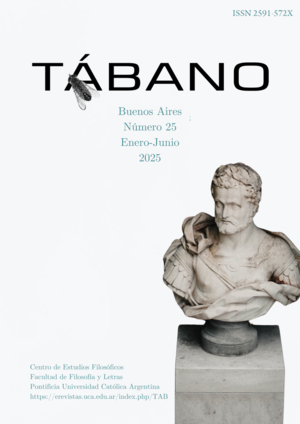El concepto deleuzo-guattariano de agencement y su recepción en Manuel DeLanda
DOI:
https://doi.org/10.46553/tab.25.2025.e3Palabras clave:
Agencement, Ensamblaje, Deleuze, Guattari, DeLandaResumen
En el presente artículo, se rastrea el concepto de agencement en la obra de Deleuze y Guattari, siguiendo sus ajustes y modificaciones desde El Anti-Edipo (1972) hasta Mil mesetas (1980), pasando por Kafka, por una literatura menor (1975). A continuación, presentaremos el concepto de assemblage en Manuel DeLanda, atendiendo a sus versiones mínima y ampliada y procurando explicitar sus puntos de contacto y de tensión con los pensadores franceses. A lo largo de este recorrido, se intentará mostrar tanto la genealogía del concepto retomado por DeLanda, como la diferencia entre las preocupaciones a las que responden los agencements y aquellas a las que responden los assemblages. La transformación del concepto, en este sentido, da cuenta de un desplazamiento de la centralidad del lenguaje en beneficio de una ontología articulada con las ciencias empíricas y formales en la cual resultará central la noción de emergencia.
Descargas
Citas
Bhaskar, R. (1997). A Realist Theory of Science. Verso.
Biset, E. (2022). Escena postextual de la teoría. Chuy. Revista de estudios literarios latinoamericanos 12, pp. 124-150.
DeLanda, M. (1991). War in the Age of Intelligent Machines. Zone Books.
DeLanda, M. (2000) [1997]. A Thousand Years of Nonlinear History. Swerve Editions.
DeLanda, M. (2024) [2002]. Ciencia intensiva y filosofía virtual. Traducción Carlos de Landa Acosta. Tinta Limón.
DeLanda, M., (2016). Assemblage Theory. Edinburgh University Press. DOI: https://doi.org/10.1515/9781474413640
DeLanda, M. (2021). Teoría de los ensamblajes y complejidad social. Traducción Carlos de Landa Acosta. Tinta Limón.
DeLanda, M. (2006). A New Philosophy of Society. Assemblage Theory and Social Complexity. Continuum.
Deleuze, G. & Guattari, F. (1972). L’Anti-Œdipe. Minuit.
Deleuze, G. & Guattari, F. (1975). Kafka. Pour une littérature mineure. Minuit.
Deleuze, G. & Guattari, F. (1980). Mille plateaux. Les Éditions de Minuit.
Deleuze, G. (1953). Empirisme et subjectivité. PUF.
Deleuze, G. (1968). Différence et répétition. PUF.
Ferreyra, J. (2016). Una apología del Estado como aparato de captura en Deleuze y Guattari. Nombres. Revista de Filosofía 30, pp. 243-266.
Fujita Hirose, J. (2021). ¿Cómo imponer un límite absoluto al capitalismo? Filosofía política de Deleuze y Guattari. Tinta Limón.
Gil, J. M. (2001). Introducción a las teorías lingüísticas del siglo XX. RIL.
Harman, G. (2016). Series Editor’s Preface. En DeLanda, M., Assemblage Theory (pp. vii-x). Edinburgh University Press.
Harnecker, M. (1967). Introducción. En L. Althusser, La revolución teórica de Marx (pp. 3-11). Traducción M. Harnecker. Siglo XXI.
Heredia, J. M. (2014). Dispositivos y/o agenciamientos. Contrastes. Revista Internacional de Filosofía 29(1), pp. 83-101.
Hjelmslev, L. (1972). Prolegómenos a una teoría del lenguaje. Traducción J. L. Díaz de Liaño. Gredos.
McNamara, R. (2021). Diversidad y espacialidad: sobre el concepto de estrato en Deleuze y Guattari. Páginas de filosofía 25, pp. 71-99.
Phillips, J. (2006). Agencement/Assemblage. Theory, Culture and Society 23 (2-3), pp. 108-109. DOI: https://doi.org/10.1177/026327640602300219
Sibertin-Blanc, G. (2015). Deleuze et l’Anti-Œdipe. PUF.
Spinelli, J. M. (2022). El concepto de agencement en El Anti-Edipo. Hybris 23, pp. 259-296.
Yehya, N. (2011). Entrevista con Manuel Delanda. Un filósofo tecnocientífico en el siglo hacker. Replicante, 10 de marzo de 2011.
Publicado
Cómo citar
Número
Sección
Licencia
Derechos de autor 2025 Pablo Pachilla

Esta obra está bajo una licencia internacional Creative Commons Atribución-NoComercial-CompartirIgual 4.0.



